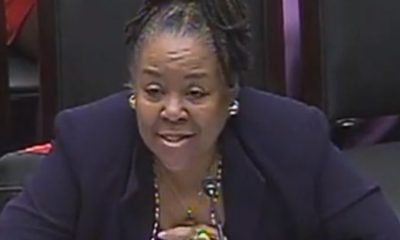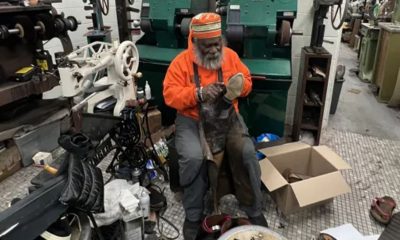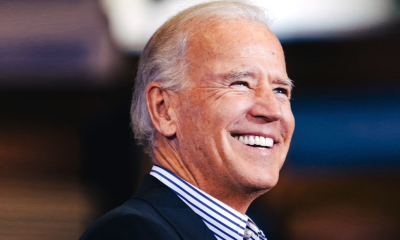Business
Hair braiding bill represents ‘new narrative’ at legislature
MINNESOTA SPOKESMAN-RECORDER — Minnesota’s record ethnic diversity at the State Capitol — including African American, Somali American, Asian American and Hispanic or Latino representation — has given legislators of color a boost when it comes to creating new perspectives on policy change.
Minnesota’s record ethnic diversity at the State Capitol — including African American, Somali American, Asian American and Hispanic or Latino representation — has given legislators of color a boost when it comes to creating new perspectives on policy change.
Local leaders like Rep. Rena Moran (DFL-Minneapolis) have hit the ground running, with 19 people of color in the House, in ensuring issues related to people of color are not only heard, but are addressed via legislation.
“When we are able to bring in our expertise and our experience to these conversations,” said Moran, “we begin to see policies that create different practices than what we have seen in the past.”
In February, she teamed with Sen. Jeff Hayden to introduce the African American Family Preservation and Child Welfare Disproportionality Act (HF142) to help keep Black youth from being displaced from their homes due to racial bias.
“The number of our [African American] kids who have been removed from their homes and from their parents and not being placed with relatives and put in homes with strangers is alarming,” Moran told the MSR. “They are away from their communities, their schools, sometimes even their siblings. This has a huge impact on not only our community, but it has an impact on how our children are developing.
“They are not feeling connected to their community or loved,” continued Moran, “so they go into these new homes and it shows up in the school. And now they are being diagnosed or placed in special ed, getting medication, or are being funneled into the youth detention centers. We’re not recognizing their trauma. We’re not recognizing and valuing the family preservation — the foundation for us as Black people.”
She authored another bill (HF554) that was approved in April to help parents directly seek to re-establish parental rights and reduce barriers for parents who lost rights for non-egregious harm. “Kids should not be lingering in foster care, and the State should never be in the business of trying to raise our kids.”
Black hair economics
Now she’s taking on Black hair and entrepreneurship via a bill (HF140) to repeal cosmetology registration requirements for braiders. Hair braiding, an art that goes back thousands of years, has been a hot-button topic across the country. While most cosmetology programs don’t teach the skill, many states require a cosmetology license to legally practice it.
Those licensure requirements include upwards of 2,000 hours of education and thousands of dollars in fees to acquire. Women have been fined tens of thousands of dollars and even jailed for braiding without it. This has led to 26 states, North Dakota most recently, ending licensing requirements for hair braiders, according to the Institute for Justice.
While Minnesota has one of the more lenient requirements — 30 hours of service — Moran hopes to repeal yet another barrier for Black women to become entrepreneurs. “It’s not like Louisiana that requires 500 hours, but we want to make sure that we are not creating mandates that are getting in the way of Black women being business owners,” said Moran.
“And, we know that in the state of Minnesota, we have less women who are business owners. We also know Black women are making somewhere near 65 cents to the dollar, as compared to a White woman making 80 cents to the dollar of their White male counterpart, who is making the whole dollar.”
Braiding, Moran said, should be “a job creator for Black women.” Instead, “Having a policy in place that states you have to have so many hours of specialty licensing for hair braiders is just a job killer.”
“There is an extreme amount of fees,” she said, to obtain licensure. “It really is a barrier to women opening up a business. The more licensing, the more training hours that a state demands, the fewer braiders that we have.”
When asked about sanitation and health risks associated with hair styling, Moran said education shouldn’t be a prohibitive factor for licensure, noting it should be common practice. “It’s just a healthy thing to do to wash a comb before you use it on another person’s head or take note of a scalp issue. But that’s more of an educational piece that needs to take place,” she added. “There are ways to work with the [MN] Department of Health to get those basic type of safety criteria in place.”
She added that the biggest opposition, which she said has been minimal, has been centered on hair loss. “I have heard some women are losing the hair at the ends of their hair — around their edges. We know that does happen based on just the braiding, the texture of your hair, and how tight the braids can be,” Moran said. “But, is that something that needs to be regulated? I would say no.”
Amplifying POCI voices
 Courtesy of Wikipedia
Courtesy of WikipediaConversations around hair may not seem crucial to mainstream populations that aren’t faced with everyday policing of their hair. The racial disparities are prevalent — from workplace policies against hairstyles to school mandates that get both students and parents locked out of school doors.
Moran is enthused to not only talk about this and other issues related to people of color, but also to have support from within to push through such legislation.
“It’s really important for me and the People of Color Indigenous (POCI) Caucus here to bring the voices of our community into this body so that we are creating and educating our colleagues through a race-conscious lens around social, racial, economic and environmental justice issues,” said Moran.
“We don’t need [non-POCI] to talk to us about our community. We have enough [POCI] here that we can do that, too, and have you just support and help lead on it. So this is one of those bills. This is just one of many that we are trying to move through this body.”
She credits the community for helping get her AAFP act into committee hearings. “The community has just shown up in really good numbers, and they have lent their voices and their stories that have been so impactful. In the House of Representatives, they gave 134 legislators a new narrative to look at when they look at our families and what is happening and how disproportionately our kids are being really put down a more punitive track while White families are getting the support that they need to get their kids connected to their families.”
Moran said she looks forward to similar support via email and letters when the braid repeal comes forth. The bill, which has received bipartisan support, is currently waiting to go into conference committee. She explained that the bill was part of a larger bill that was vetoed last year, but she is confident it will pass this session.
“It’s so important that we are leading the narrative about what is important for our community. We want to be on the front end. We want to be about planning and navigating [our stories].”
This article originally appeared in the Minnesota Spokesman-Recorder.
Activism
Oakland Post: Week of April 24 – 30, 2024
The printed Weekly Edition of the Oakland Post: Week of April 24 – 30, 2024

To enlarge your view of this issue, use the slider, magnifying glass icon or full page icon in the lower right corner of the browser window. ![]()
Bay Area
State Controller Malia Cohen Keynote Speaker at S.F. Wealth Conference
California State Controller Malia Cohen delivered the keynote speech to over 50 business women at the Black Wealth Brunch held on March 28 at the War Memorial and Performing Arts Center at 301 Van Ness Ave. in San Francisco. The Enterprising Women Networking SF Chapter of the American Business Women’s Association (ABWA) hosted the Green Room event to launch its platform designed to close the racial wealth gap in Black and Brown communities.

By Carla Thomas
California State Controller Malia Cohen delivered the keynote speech to over 50 business women at the Black Wealth Brunch held on March 28 at the War Memorial and Performing Arts Center at 301 Van Ness Ave. in San Francisco.
The Enterprising Women Networking SF Chapter of the American Business Women’s Association (ABWA) hosted the Green Room event to launch its platform designed to close the racial wealth gap in Black and Brown communities.
“Our goal is to educate Black and Brown families in the masses about financial wellness, wealth building, and how to protect and preserve wealth,” said ABWA San Francisco Chapter President LaRonda Smith.
ABWA’s mission is to bring together businesswomen of diverse occupations and provide opportunities for them to help themselves and others grow personally and professionally through leadership, education, networking support, and national recognition.
“This day is about recognizing influential women, hearing from an accomplished woman as our keynote speaker and allowing women to come together as powerful people,” said ABWA SF Chapter Vice President Velma Landers.
More than 60 attendees dined on the culinary delights of Chef Sharon Lee of The Spot catering, which included a full soul food brunch of skewered shrimp, chicken, blackened salmon, and mac and cheese.
Cohen discussed the many economic disparities women and people of color face. From pay equity to financial literacy, Cohen shared not only statistics, but was excited about a new solution in motion which entailed partnering with Californians for Financial Education.
“I want everyone to reach their full potential,” she said. “Just a few weeks ago in Sacramento, I partnered with an organization, Californians for Financial Education.
“We gathered 990 signatures and submitted it to the [California] Secretary of State to get an initiative on the ballot that guarantees personal finance courses for every public school kid in the state of California.
“Every California student deserves an equal opportunity to learn about filing taxes, interest rates, budgets, and understanding the impact of credit scores. The way we begin to do that is to teach it,” Cohen said.
By equipping students with information, Cohen hopes to close the financial wealth gap, and give everyone an opportunity to reach their full financial potential. “They have to first be equipped with the information and education is the key. Then all we need are opportunities to step into spaces and places of power.”
Cohen went on to share that in her own upbringing, she was not guided on financial principles that could jump start her finances. “Communities of color don’t have the same information and I don’t know about you, but I did not grow up listening to my parents discussing their assets, their investments, and diversifying their portfolio. This is the kind of nomenclature and language we are trying to introduce to our future generations so we can pivot from a life of poverty so we can pivot away and never return to poverty.”
Cohen urged audience members to pass the initiative on the November 2024 ballot.
“When we come together as women, uplift women, and support women, we all win. By networking and learning together, we can continue to build generational wealth,” said Landers. “Passing a powerful initiative will ensure the next generation of California students will be empowered to make more informed financial decisions, decisions that will last them a lifetime.”
Business
Black Business Summit Focuses on Equity, Access and Data
The California African American Chamber of Commerce hosted its second annual “State of the California African American Economy Summit,” with the aim of bolstering Black economic influence through education and fellowship. Held Jan. 24 to Jan. 25 at the Westin Los Angeles Airport Hotel, the convention brought together some of the most influential Black business leaders, policy makers and economic thinkers in the state. The discussions focused on a wide range of economic topics pertinent to California’s African American business community, including policy, government contracts, and equity, and more.

By Solomon O. Smith, California Black Media
The California African American Chamber of Commerce hosted its second annual “State of the California African American Economy Summit,” with the aim of bolstering Black economic influence through education and fellowship.
Held Jan. 24 to Jan. 25 at the Westin Los Angeles Airport Hotel, the convention brought together some of the most influential Black business leaders, policy makers and economic thinkers in the state. The discussions focused on a wide range of economic topics pertinent to California’s African American business community, including policy, government contracts, and equity, and more.
Toks Omishakin, Secretary of the California State Transportation Agency (CALSTA) was a guest at the event. He told attendees about his department’s efforts to increase access for Black business owners.
“One thing I’m taking away from this for sure is we’re going to have to do a better job of connecting through your chambers of all these opportunities of billions of dollars that are coming down the pike. I’m honestly disappointed that people don’t know, so we’ll do better,” said Omishakin.
Lueathel Seawood, the president of the African American Chamber of Commerce of San Joaquin County, expressed frustration with obtaining federal contracts for small businesses, and completing the process. She observed that once a small business was certified as DBE, a Disadvantaged Business Enterprises, there was little help getting to the next step.
Omishakin admitted there is more work to be done to help them complete the process and include them in upcoming projects. However, the high-speed rail system expansion by the California High-Speed Rail Authority has set a goal of 30% participation from small businesses — only 10 percent is set aside for DBE.
The importance of Diversity, Equity and Inclusion (DEI) in economics was reinforced during the “State of the California Economy” talk led by author and economist Julianne Malveaux, and Anthony Asadullah Samad, Executive Director of the Mervyn Dymally African American Political and Economic Institute (MDAAPEI) at California State University, Dominguez Hills.
Assaults on DEI disproportionately affect women of color and Black women, according to Malveaux. When asked what role the loss of DEI might serve in economics, she suggested a more sinister purpose.
“The genesis of all this is anti-blackness. So, your question about how this fits into the economy is economic exclusion, that essentially has been promoted as public policy,” said Malveaux.
The most anticipated speaker at the event was Janice Bryant Howroyd known affectionately to her peers as “JBH.” She is one of the first Black women to run and own a multi-billion-dollar company. Her company ActOne Group, is one of the largest, and most recognized, hiring, staffing and human resources firms in the world. She is the author of “Acting Up” and has a profile on Forbes.
Chairman of the board of directors of the California African American Chamber of Commerce, Timothy Alan Simon, a lawyer and the first Black Appointments Secretary in the Office of the Governor of California, moderated. They discussed the state of Black entrepreneurship in the country and Howroyd gave advice to other business owners.
“We look to inspire and educate,” said Howroyd. “Inspiration is great but when I’ve got people’s attention, I want to teach them something.”
-

 Community2 weeks ago
Community2 weeks agoFinancial Assistance Bill for Descendants of Enslaved Persons to Help Them Purchase, Own, or Maintain a Home
-

 Activism4 weeks ago
Activism4 weeks agoOakland Post: Week of April 3 – 6, 2024
-

 Business2 weeks ago
Business2 weeks agoV.P. Kamala Harris: Americans With Criminal Records Will Soon Be Eligible for SBA Loans
-

 Community2 weeks ago
Community2 weeks agoAG Bonta Says Oakland School Leaders Should Comply with State Laws to Avoid ‘Disparate Harm’ When Closing or Merging Schools
-

 Activism3 weeks ago
Activism3 weeks agoOakland Post: Week of April 10 – 16, 2024
-

 Community2 weeks ago
Community2 weeks agoOakland WNBA Player to be Inducted Into Hall of Fame
-

 Community2 weeks ago
Community2 weeks agoRichmond Nonprofit Helps Ex-Felons Get Back on Their Feet
-

 Community2 weeks ago
Community2 weeks agoRPAL to Rename Technology Center for Retired Police Captain Arthur Lee Johnson





















































